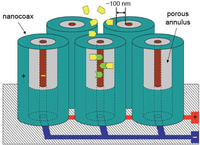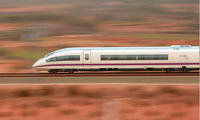-
Improving high-speed rail ties against freezing, thawing conditions
Research project is helping high-speed rail systems handle the stress of freezing and thawing weather conditions; the 3-year study looks at the freeze-thaw durability of concrete railroad ties; the research is essential to developing safe and durable high-speed rail systems
-
-
New Jersey “Texting against Terror” program a success
A $5.8 million federally funded program allowing New Jersey Transit commuters to “text against terror” has received 307 tips to the agency since the program started in June 2011; of those 307 messages, seventy-one have “referred to something regarding homeland security,” said Christopher Trucillo, chief of N.J. Transit Police
-
-
BART to adopt earthquake early warning system
Thanks to assistance from the Berkeley Seismological Laboratory, the San Francisco Bay Area Rapid Transit (BART) system can now automatically brake trains when earthquakes threaten to rattle the Bay Area, allowing perhaps tens of seconds to a minute for trains to slow down before the ground starts to shake
-
-
More traffic deaths following 9/11
In the wake of the terrorist attacks of 11 September 2001, many Americans started driving more due to a fear of flying — and lost their lives in traffic accidents; why did this happen more frequently in some states than in others? Why did Spanish driving habits not change in the same way following the 2004 train bombings in Madrid? Psychologists offer an answer
-
-
DHS using Boston subway system to test new sensors for biological agents

Bioterrorism is nothing new, and although medicines have made the world a safer place against a myriad of old scourges both natural and manmade, it still remains all too easy today to uncork a dangerous cloud of germs; DHS’s Science and Technology Directorate (DHS S&T) has scheduled a series of tests in the Boston subways to measure the real-world performance of new sensors recently developed to detect biological agents
-
-
How to act if there is a fire on a high-speed train

Researchers have used computer models to analyze the best way to evacuate the Spanish High Speed Train (AVE) in the case of fire; the involvement of the crew in organizing the fast transfer of passengers, completing the process before the train comes to a halt, and collective collaboration to assist those with reduced mobility are just some of the strategies to be followed
-
-
Engineering students build U.K. first hydrogen powered locomotive
Engineering students and staff at the University of Birmingham have designed and built a prototype hydrogen powered locomotive, the first of its kind to operate in the United Kingdom
-
-
Bulgaria bus bombing underscores vulnerability of public transport: MTI experts
The Mineta Transportation Institute’s (MTI) Database on Terrorist and Serious Criminal Attacks Against Public Surface Transportation records 3,159 attacks against public surface transportation between January 1970 and January 2012, in which 7,997 people were killed and 30,046 were injured; of these attacks, 47.4 percent were against buses, bus stations, and bus stops; they accounted for 55 percent of the fatalities and 41 percent of the injuries resulting from terrorist attacks during this period
-
-
Planning traffic routing in no-notice disasters
Spontaneous evacuations of New York City and Washington, D.C. following the 9/11 terrorist attacks demonstrated that U.S. cities are not prepared to manage the sudden influx of traffic into roads and highways following a no-notice disaster
-
-
£5 million investment in U.K. rail technology, business innovation
The U.K. government is leading on an investment of £5 million to accelerate business innovation and growth in the U.K. rail industry, using the funds to support the development of technologies to address technological and business challenges
-
-
Reducing fatalities in traffic’s “twilight zone”

There are more than 30,000 traffic fatalities each year in the United States, and about 2,000 of them occur in stoplight intersections; engineers call them “dilemma zone” — that area before a stoplight intersection where the traffic light turns yellow and the driver is not sure whether to stop or go ahead
-
-
Making bus transportation more secure: Learning from Israel’s experience
A new report on ground transportation security draws on the experience of Israel with Palestinian terrorists’ attacks on buses; the report helps increase understanding of what can happen and of what can deter, prevent, and mitigate terrorist attacks against bus transit
-
-
Hackers attack U.S. railways
Last month hackers took control of passenger rail lines in the Northwest, disrupting signals twice and creating delays
-
-
Canada tests explosive detecting ticket readers
In a pilot program, Canadian light rail passengers in Edmonton will be scanned for explosives as they pass through ticket turnstiles in a seamless system that avoids recreating the long lines of airport security checkpoints
-
-
Congressional transportation security caucus formed
On Thursday members of the House Homeland Security Committee announced that they were starting a “Transportation Security Caucus”
-
- All
- Regional
- Water
- Biometrics
- Borders/Immig
- Business
- Cybersecurity
- Detection
- Disasters
- Government
- Infrastructure
- International
- Public health
- Public Safety
- Communication interoperabillity
- Emergency services
- Emergency medical services
- Fire
- First response
- IEDs
- Law Enforcement
- Law Enforcement Technology
- Military technology
- Nonlethal weapons
- Nuclear weapons
- Personal protection equipment
- Police
- Notification /alert systems
- Situational awareness
- Weapons systems
- Sci-Tech
- Sector Reports
- Surveillance
- Transportation
Advertising & Marketing: advertise@newswirepubs.com
Editorial: editor@newswirepubs.com
General: info@newswirepubs.com
2010-2011 © News Wire Publications, LLC News Wire Publications, LLC
220 Old Country Road | Suite 200 | Mineola | New York | 11501
Permissions and Policies
Editorial: editor@newswirepubs.com
General: info@newswirepubs.com
2010-2011 © News Wire Publications, LLC News Wire Publications, LLC
220 Old Country Road | Suite 200 | Mineola | New York | 11501
Permissions and Policies
